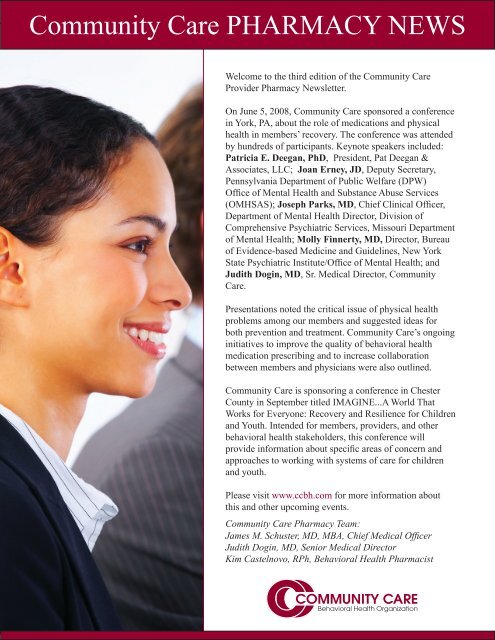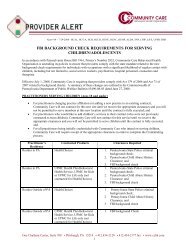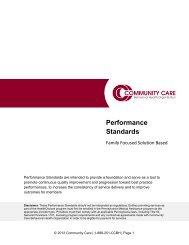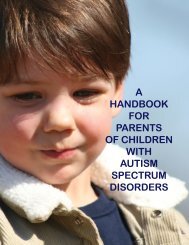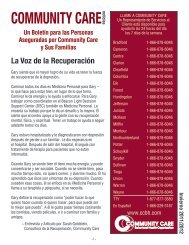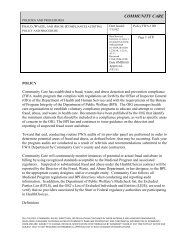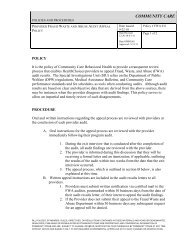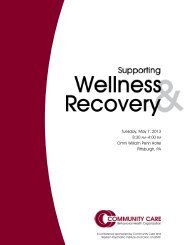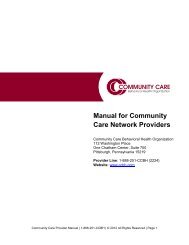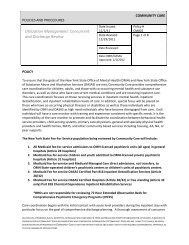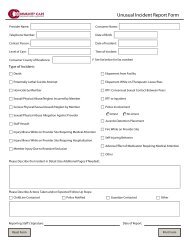Community Care PHARMACY NEWS - Community Care Behavioral ...
Community Care PHARMACY NEWS - Community Care Behavioral ...
Community Care PHARMACY NEWS - Community Care Behavioral ...
You also want an ePaper? Increase the reach of your titles
YUMPU automatically turns print PDFs into web optimized ePapers that Google loves.
<strong>Community</strong> <strong>Care</strong> <strong>PHARMACY</strong> <strong>NEWS</strong><br />
Welcome to the third edition of the <strong>Community</strong> <strong>Care</strong><br />
Provider Pharmacy Newsletter.<br />
On June 5, 2008, <strong>Community</strong> <strong>Care</strong> sponsored a conference<br />
in York, PA, about the role of medications and physical<br />
health in members’ recovery. The conference was attended<br />
by hundreds of participants. Keynote speakers included:<br />
Patricia E. Deegan, PhD, President, Pat Deegan &<br />
Associates, LLC; Joan Erney, JD, Deputy Secretary,<br />
Pennsylvania Department of Public Welfare (DPW)<br />
Office of Mental Health and Substance Abuse Services<br />
(OMHSAS); Joseph Parks, MD, Chief Clinical Officer,<br />
Department of Mental Health Director, Division of<br />
Comprehensive Psychiatric Services, Missouri Department<br />
of Mental Health; Molly Finnerty, MD, Director, Bureau<br />
of Evidence-based Medicine and Guidelines, New York<br />
State Psychiatric Institute/Office of Mental Health; and<br />
Judith Dogin, MD, Sr. Medical Director, <strong>Community</strong><br />
<strong>Care</strong>.<br />
Presentations noted the critical issue of physical health<br />
problems among our members and suggested ideas for<br />
both prevention and treatment. <strong>Community</strong> <strong>Care</strong>’s ongoing<br />
initiatives to improve the quality of behavioral health<br />
medication prescribing and to increase collaboration<br />
between members and physicians were also outlined.<br />
<strong>Community</strong> <strong>Care</strong> is sponsoring a conference in Chester<br />
County in September titled IMAGINE...A World That<br />
Works for Everyone: Recovery and Resilience for Children<br />
and Youth. Intended for members, providers, and other<br />
behavioral health stakeholders, this conference will<br />
provide information about specific areas of concern and<br />
approaches to working with systems of care for children<br />
and youth.<br />
Please visit www.ccbh.com for more information about<br />
this and other upcoming events.<br />
<strong>Community</strong> <strong>Care</strong> Pharmacy Team:<br />
James M. Schuster, MD, MBA, Chief Medical Officer<br />
Judith Dogin, MD, Senior Medical Director<br />
Kim Castelnovo, RPh, <strong>Behavioral</strong> Health Pharmacist
MEDICATION AND PREGNANCY<br />
More than 500,000 U.S. pregnancies each year<br />
involve women who have psychiatric illnesses<br />
that either predate or emerge during pregnancy,<br />
and an estimated one-third of all pregnant women<br />
are exposed to a psychotropic medication during<br />
pregnancy (1). There is much to consider when<br />
deciding if and when to use psychotropic medications<br />
during pregnancy. Risks of the medication to the<br />
unborn infant must be balanced against risks to the<br />
mother and fetus if the behavioral health illness is<br />
left untreated.<br />
The American College of Obstetricians and<br />
Gynecologists (ACOG) has developed a practice<br />
bulletin on the clinical management guidelines for<br />
using psychiatric medication during pregnancy. The<br />
information below is summarized from this bulletin<br />
and other references noted below.<br />
In many cases, the overall benefit of psychotropic<br />
medication to pregnant women is greater than the risk,<br />
and being maintained on medication is appropriate.<br />
Maternal psychiatric illness, if inadequately treated or<br />
untreated, may result in poor compliance with prenatal<br />
care, inadequate diet, increased alcohol and tobacco<br />
use, deficits in mother-infant bonding, disruptions<br />
within the family environment, and increased risk for<br />
postpartum symptoms and suicide attempts.<br />
General recommendations / conclusions include:<br />
• Multidisciplinary management to facilitate care.<br />
• A single medication at a higher dose is favored<br />
over multiple medications.<br />
• Avoid changing medications unless necessary, as<br />
multiple medications increase the exposure to the<br />
unborn infant.<br />
• Selection of medication to minimize the risk of<br />
illness should be based on history of efficacy, prior<br />
exposure during pregnancy, and available<br />
reproductive safety information.<br />
• Medications with fewer metabolites, higher protein<br />
binding (decreases placental passage), and fewer<br />
interactions with other medications are preferred.<br />
• Before prescribing medication to a pregnant<br />
woman, document all fetal exposures (alcohol,<br />
other medications, environmental) in the record<br />
to avoid assignment of causality to a prescribed<br />
- 2 -<br />
medication in the event of a poor pregnancy<br />
outcome.<br />
Antidepressant considerations include:<br />
• Findings suggest that individual SSRIs may<br />
confer increased risks for some specific defects,<br />
specifically with paroxetine exposure. But it should<br />
be recognized that the specific defects are rare and<br />
the absolute risks are small (2).<br />
Mood stabilizer considerations include:<br />
• Lithium exposure in pregnancy may be associated<br />
with a small increase in congenital cardiac<br />
malformations, with a risk ratio of 1.2–7.7.<br />
• Fetal assessment with fetal echocardiogram should<br />
be considered in pregnant women exposed to<br />
lithium in the first trimester.<br />
• Valproate exposure in pregnancy is associated with<br />
an increased risk of fetal anomalies, including<br />
neural tube defects, fetal valproate syndrome,<br />
and long-term adverse neurocognitive effects and,<br />
if possible, should be avoided, especially during the<br />
first trimester. If used, the patient should be on<br />
4mg of folate daily.<br />
• Carbamazepine exposure in pregnancy is<br />
associated with fetal carbamazepine syndrome and,<br />
if possible, should be avoided, especially during the<br />
first trimester. If used, the patient should be on<br />
4 mg of folate daily.<br />
• Lamotrigine is a potential maintenance therapy<br />
option for pregnant women with bipolar disorder.<br />
There is a small risk of oral cleft palate. If used,<br />
the patient should be on 4 mg of folate daily.<br />
Benzodiazepine considerations include:<br />
• Maternal benzodiazepine use shortly before<br />
delivery is associated with floppy infant syndrome.<br />
• Prenatal benzodiazepine exposure increased the<br />
risk of oral cleft, although the absolute risk<br />
increased by 0.01%.<br />
Antipsychotic considerations include:<br />
• Treatment is often indicated when members are<br />
pregnant and psychotic.<br />
(continued on page 3)
FORMULARY UPDATES<br />
MEDICATION AND<br />
PREGNANCY<br />
(continued from page 2)<br />
• High-potency typical<br />
antipsychotics are<br />
preferred though there are<br />
reports of extrapyramidal<br />
effects in exposed infants.<br />
• Safety data regarding<br />
the use of atypical<br />
antipsychotics is<br />
extremely limited.<br />
The November 2007 issue<br />
of the ACOG bulletin<br />
provides more detailed<br />
information on medication<br />
management options. For<br />
the complete bulletin, visit:<br />
http://www.accessplus.<br />
org/downloads/Maternity/<br />
ACOGPsychiatric<br />
Medication.pdf<br />
<strong>Behavioral</strong> Health Formulary Changes<br />
<strong>Community</strong> <strong>Care</strong> would like to update you regarding behavioral health<br />
formulary changes that have occurred or will occur for Medical Assistance<br />
members. The physical health MCOs that manage the Medical Assistance<br />
pharmacy benefits have informed us of the changes in the attached table.<br />
Health Plans that have formulary changes will contact members and providers<br />
who are using any of the drugs affected by the formulary update. If you have<br />
any questions concerning these updates, please contact the respective Health<br />
Plan’s Pharmacy Services number as provided.<br />
Physical Health Plan -<br />
Pharmacy Services<br />
AmeriChoice<br />
1-800-922-1557<br />
www.americhoice.com<br />
<strong>PHARMACY</strong> UPDATES 2008<br />
Updates<br />
• Chantix requires Prior Authorization<br />
• Gabitril, Keppra, Lamictal, Topamax,<br />
Trileptal, and Zonegran – require Prior<br />
Authorization for NEW starts only.<br />
Current users will be grandfathered.<br />
Effective<br />
April<br />
2008<br />
For referral information,<br />
call the <strong>Community</strong><br />
<strong>Care</strong> Provider Line,<br />
1-888-251-2224.<br />
AmeriHealth Mercy/KMHP<br />
1-866-610-2774<br />
1-800-521-6007<br />
www.amerihealthmercyhp.com<br />
www.keystonemercy.com<br />
• Vyvanse added to formulary<br />
• Chantix covered for up to 24 weeks of<br />
therapy (members > 18 years old)<br />
April<br />
2008<br />
Sources:<br />
1. Doering PL, Stewart RB.<br />
The extent and character<br />
of drug consumption<br />
during pregnancy. JAMA<br />
1978;239: 843–6.<br />
Health Partners<br />
1-888-991-9023<br />
www.healthpart.com<br />
Gateway Health Plan<br />
1-800-528-6738<br />
www.gatewayhealthplan.com<br />
• No updates to report at this time.<br />
• No updates to report at this time.<br />
July<br />
2008<br />
July<br />
2008<br />
2. Louik C, Lin AE, Werler<br />
MM, Hernandez-Diaz<br />
S, Mitchell AA. First-<br />
Trimester Use of Selective<br />
Serotonin-Reuptake<br />
Inhibitors and the Risk of<br />
Birth Defects. N ENGL J<br />
MED 2007;356: 2675-83.<br />
Unison Health Plan<br />
1-877-651-2217<br />
www.unisonhealthplan.com<br />
UPMC for You<br />
1-800-396-4139<br />
www.upmchealthplan.com<br />
• No updates to report at this time.<br />
• Suboxone and Subutex will require<br />
prior authorization for continuation<br />
therapy past 3 months.<br />
• NEW Starts to Abilify will require<br />
prior authorization. Current users will<br />
be grandfathered.<br />
July<br />
2008<br />
Sept<br />
2008<br />
- 3 -
PRODUCT UPDATES<br />
Please be aware that the information discussed in this section is solely for informational<br />
purposes. It does not dictate availability on health plan formularies.<br />
New Formulations<br />
February 2008 – Luvox CR 100mg and 150mg<br />
(extended release capsules) has been approved by<br />
the FDA for the treatment of Social Anxiety Disorder<br />
and Obsessive Compulsive disorder in adults.<br />
New Indications<br />
February 2008 - Abilify received FDA approval for<br />
the acute treatment of manic and mixed episodes<br />
associated with Bipolar I Disorder in pediatric<br />
patients (age 10-17).<br />
February 2008 – Vyvanse is now available in 20mg,<br />
40mg, and 60mg capsule strengths. Vyvanse is FDA<br />
approved for the treatment of ADHD.<br />
March 2008 – Pristiq (desvenlafaxine succinate)<br />
50mg and 100mg extended release tablet has been<br />
approved by the FDA for the treatment of adult<br />
patients with Major Depression Disorder.<br />
March 2008 - Liquadd (dextroamphetamine sulfate)<br />
Oral Solution 5 mg/5 mL has been approved by the<br />
FDA for the treatment of Attention Deficit Disorder<br />
with Hyperactivity (ADHD).<br />
New Generic<br />
May 2008 – Zaleplon 5mg and 10mg now available<br />
(generic Sonata).<br />
May 2008 – Paroxetine CR 12.5mg, 25mg. and<br />
37.5mg now available (generic Paxil CR).<br />
June 2008 – Bupropion XL 150mg now available<br />
(300mg strength has been available).<br />
April 2008 – Vyvanse received approval from<br />
the FDA for the treatment of Attention Deficit<br />
Hyperactivity Disorder (ADHD) in adults.<br />
Previously, it was only approved for children<br />
age 6-12.<br />
May 2008 – Strattera approved for maintenance of<br />
ADHD in children and adolescents.<br />
May 2008 - Abilify receives expanded indications<br />
for maintenance treatment in both pediatric patients<br />
(age 10-17) with manic and mixed episodes of<br />
Bipolar I Disorder and adolescents (age 13-17) with<br />
Schizophrenia.<br />
June 2008 – Cymbalta received FDA approval to<br />
treat Fibromyalgia. It is already approved for diabetic<br />
nerve pain, MDD, and GAD.<br />
June 2008 – Concerta received expanded FDA<br />
approval for the treatment of Attention Deficit<br />
Hyperactivity Disorder in adults (age 18 to 65).<br />
Previously, it was only approved for children and<br />
adolescents.<br />
June 2008 – Teva receives 180 days of generic<br />
exclusivity to market Risperidone tablets (generic<br />
Risperdal). The patent on Risperdal expired on June<br />
29, 2008. Generics to Risperdal M-Tabs and the oral<br />
solution have not been approved yet.<br />
- 4 -
SAFETY UPDATES<br />
Increased risk of suicidality with<br />
antiepileptic medications<br />
New warnings added to<br />
Chantix<br />
The FDA is informing all health care professionals of<br />
increased risk of suicidality (suicidal behavior or ideation)<br />
in patients being treated with antiepileptic medications.<br />
The warning is based on analyzed reports from placebocontrolled<br />
clinical studies of 11 drugs used to treat epilepsy<br />
as well as psychiatric disorders and other conditions. In the<br />
FDA’s analysis, patients receiving antiepileptic drugs had<br />
approximately twice the risk of suicidal behavior or ideation<br />
(0.43%) compared to patients receiving placebo (0.22%). The<br />
increased risk of suicidal behavior and suicidal ideation was<br />
observed as early as one week after starting the antiepileptic<br />
drug and continued through 24 weeks. The results were<br />
generally consistent among the 11 drugs. The relative risk for<br />
suicidality was higher in the patients with epilepsy compared<br />
to patients who were given one of the drugs in the class for<br />
psychiatric or other conditions.<br />
All patients who are currently taking or starting on any<br />
antiepileptic drug should be closely monitored for notable<br />
changes in behavior that could indicate the emergence or<br />
worsening of suicidal thoughts or behavior or depression.<br />
The drugs included in the analyses include:<br />
• Carbamazepine (marketed as Carbatrol, Equetro, Tegretol,<br />
Tegretol XR)<br />
• Felbamate (marketed as Felbatol)<br />
• Gabapentin (marketed as Neurontin)<br />
• Lamotrigine (marketed as Lamictal)<br />
• Levetiracetam (marketed as Keppra)<br />
• Oxcarbazepine (marketed as Trileptal)<br />
• Pregabalin (marketed as Lyrica)<br />
• Tiagabine (marketed as Gabitril)<br />
• Topiramate (marketed as Topamax)<br />
• Valproate (marketed as Depakote, Depakote ER, Depakene,<br />
Depacon)<br />
• Zonisamide (marketed as Zonegran)<br />
Although 11 drugs were included in the analysis, FDA<br />
expects that the increased risk of suicidality is shared by<br />
all antiepileptic drugs and anticipates that the class labeling<br />
changes will be applied broadly. For the complete MedWatch<br />
Safety Summary, please refer to the FDA website, http://www.<br />
fda.gov/medwatch/safety/2008/safety08.htm#Antiepileptic.<br />
- 5 -<br />
Since the FDA first informed the<br />
public about the possibility of serious<br />
neuropsychiatric symptoms associated<br />
with the use of Chantix, it has become<br />
increasingly likely that the association exists.<br />
As a result, the FDA has requested that this<br />
safety information be added to the warnings<br />
and precautions sections of the Chantix<br />
prescribing information. These symptoms<br />
include changes in behavior, agitation,<br />
depressed mood, suicidal ideation, and<br />
attempted and completed suicide.<br />
While some patients may have experienced<br />
these types of symptoms and events as a<br />
result of nicotine withdrawal, some patients<br />
taking Chantix who experienced serious<br />
neuropsychiatric symptoms and events had<br />
not yet discontinued smoking. In most cases,<br />
neuropsychiatric symptoms developed during<br />
Chantix treatment, but in others, symptoms<br />
developed following withdrawal of Chantix<br />
therapy.<br />
The FDA is working with the manufacturer<br />
to finalize a Medication Guide for patients.<br />
For the complete MedWatch Safety<br />
Summary along with information for health<br />
care professionals on using Chantix therapy<br />
please refer to the FDA website, http://www.<br />
fda.gov/medwatch/safety/2008/safety08.<br />
htm#Varenicline.
SAFETY UPDATES<br />
Possible link between Singulair and<br />
suicidal behavior<br />
The FDA is investigating a possible association between the use of<br />
Singulair and behavior/mood changes, suicidality (suicidal thinking and<br />
behavior) and suicide.<br />
Singulair is a medicine in the drug class known as leukotriene<br />
receptor antagonists. It is used to treat asthma and the symptoms of<br />
allergic rhinitis and to prevent exercise-induced asthma. Over the<br />
past year, the maker of Singulair, Merck & Co, Inc., has updated the<br />
prescribing information for Singulair to include the following postmarketing<br />
adverse events: tremor (March 2007), depression (April<br />
2007), suicidality (suicidal thinking and behavior) (October 2007), and<br />
anxiousness (February 2008).<br />
The FDA is working with Merck to further evaluate a possible link<br />
between the use of Singulair and behavior/mood changes, suicidality,<br />
and suicide in response to inquiries received by FDA. Due to the<br />
complexity of the analyses, FDA anticipates that it may take up to 9<br />
months to complete the ongoing evaluations. Once completed, the FDA<br />
will communicate the conclusions and recommendations to the public.<br />
Until further information is available, health care providers should<br />
monitor patients taking Singulair for suicidality (suicidal<br />
thinking and behavior) and changes in behavior and mood.<br />
For the complete 2008 FDA MedWatch Safety<br />
Summary, please refer to the FDA website at:<br />
http://www.fda.gov/medwatch/safety/2008/<br />
safety08.htm#Singulair.<br />
Conventional antipsychotics<br />
to carry boxed warning<br />
The FDA announced on Monday, June 16, 2008, that<br />
manufacturers must now add a boxed warning to<br />
conventional or first-generation antipsychotic medications to<br />
alert physicians of the increased risk of death in elderly adults<br />
being treated for dementia-related psychosis.<br />
Back in 2005, the agency issued a similar warning for the<br />
atypical antipsychotics.<br />
- 6 -<br />
Please send your article suggestions,<br />
comments, and questions to:<br />
Kim Castelnovo, RPh<br />
<strong>Community</strong> <strong>Care</strong><br />
One Chatham Center, Suite 700<br />
112 Washington Place<br />
Pittsburgh, PA 15219<br />
E-mail: castelnovokm@ccbh.com


